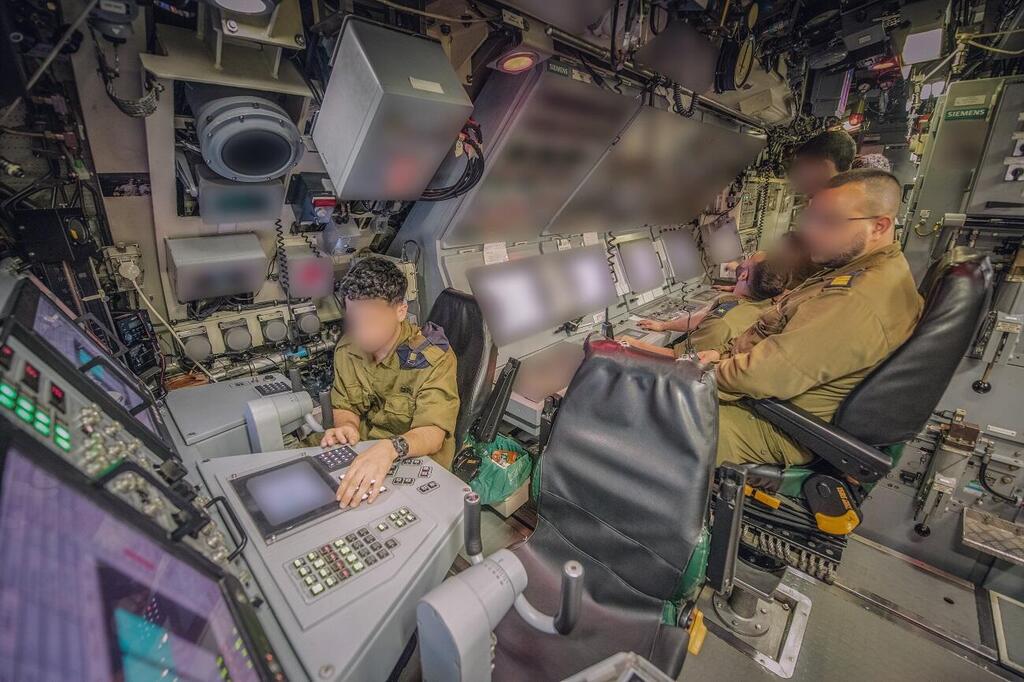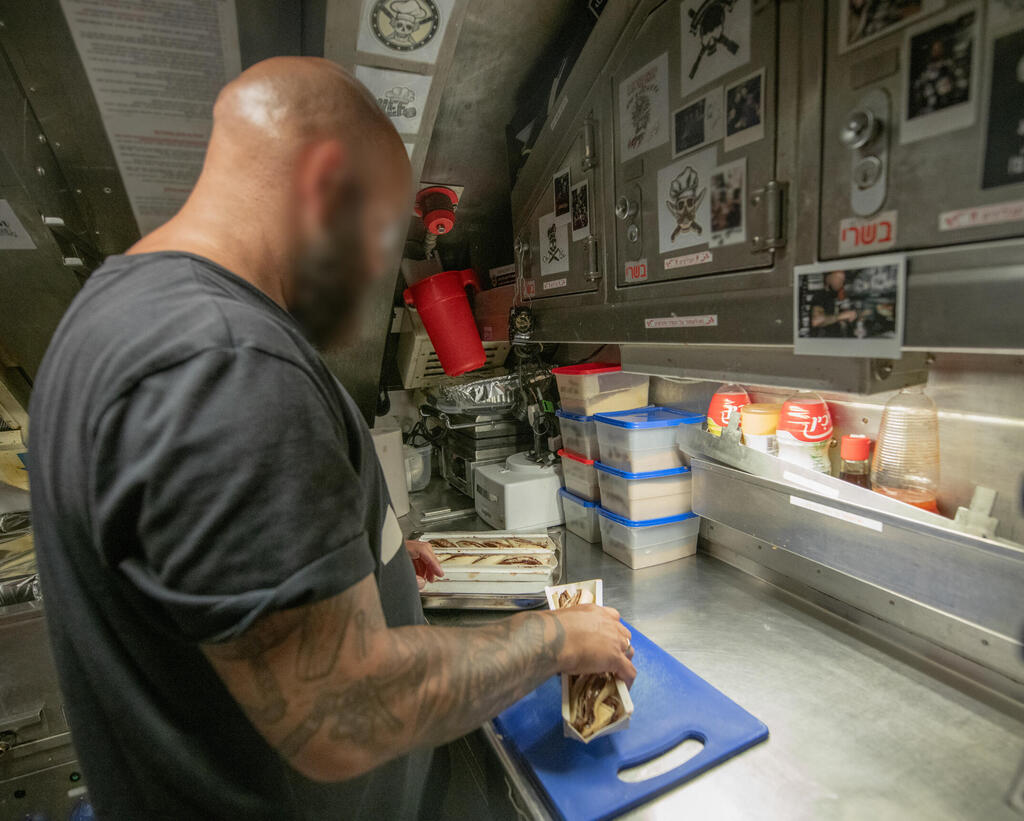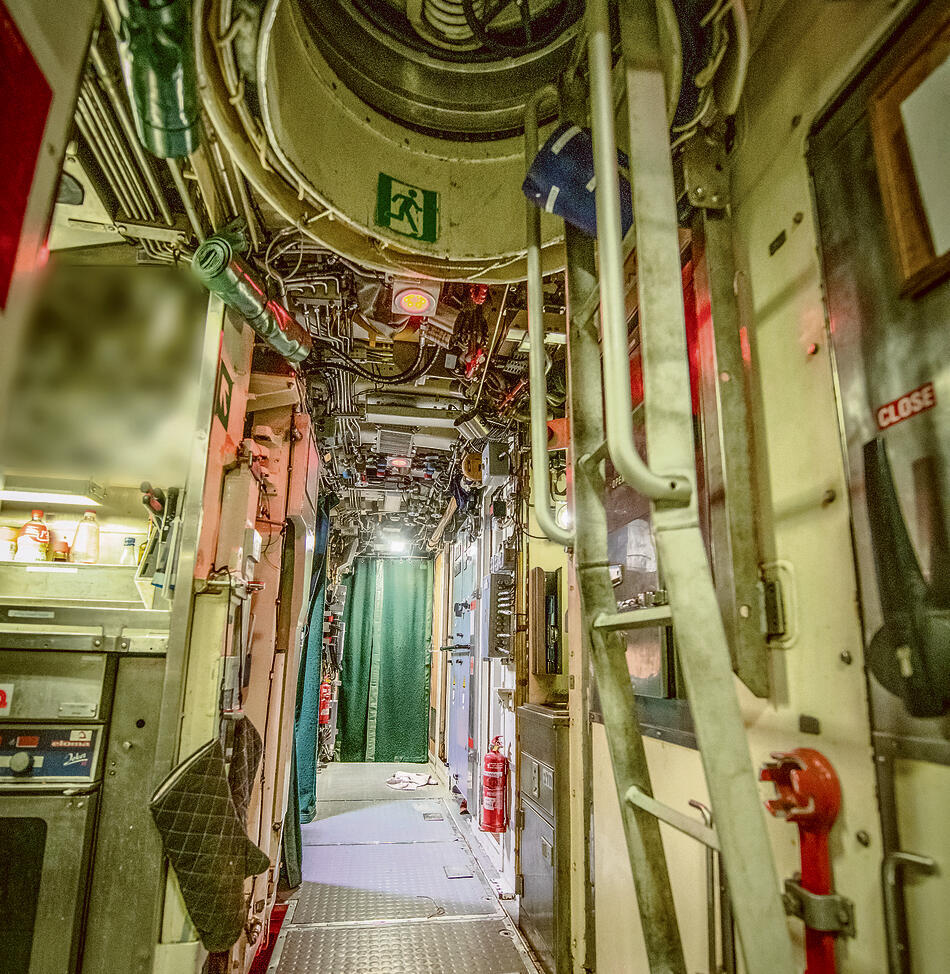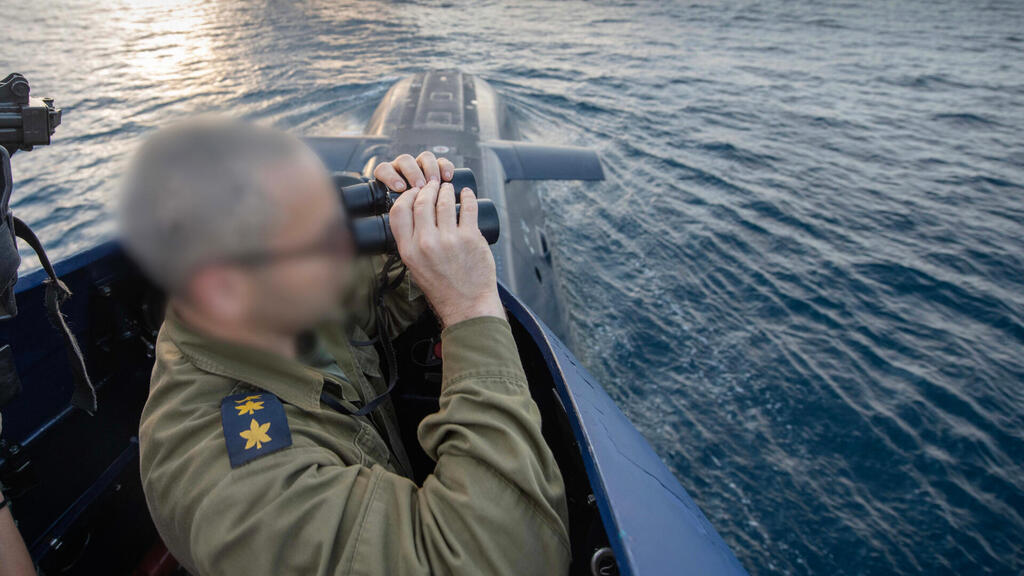At 1 a.m., maybe a bit later, in the depths of the Mediterranean, off the country’s northern shores, as most Israelis are sleeping through the war, a submarine cruises by, hardly making a sound. No one knows where it came from or where it’s going. Its movements are discreet, as is its mission.
The only thing we can say for sure is that it’s in safe hands. Where’s the firing button? My patience is running low. I’m feeling my thumb burning up. And the brakes, where did they put the brakes? I can’t find them.
I swear, how can you possibly understand anything here? Everything’s so complicated in this submarine. I’m surrounded by countless gauges, lights, valves switches and buttons. Hundreds, yes hundreds. I’ve never seen so many. And they all look tempting. You just want to press everything to be sure.
Here, it’s just the rudders. Chief D. is doing his best to stay relaxed about the torpedo buttons etc. Maybe it’s dawning on him that giving a weapon of war to a person who thinks he’s in Fortnite, wasn’t such a good idea after all. Especially not a weapon of war that Wikipedia says costs 1.6 billion shekels and is the most expensive the IDF has.
A seasoned navigator with a vigilant gaze is sitting next to me. He also has rudders. “Go down, more, more,” says the chief. I pull the rudders straight towards me, then I push, then towards me again. The submarine descends.
55 meters. 60 meters. The navigator recalls how the chief of staff once visited the submarine and was given the rudder, and that the lieutenant general then realized they were messing with him as the submarine was an automatic. “It’s not like that now,” he quickly reassures me.
70 meters. 80 meters. The submarine needs to be stabilized as much as possible as we descend. Any weight is factored in. Earlier on over dinner, one of the officers told me that, as most of the crew eats in the bow, the weight has to be balanced out by transferring water to the stern using ballast tanks.
“Balance it, balance it,” the chief says now. The submarine’s angle is a bit sharp, cutting into the sea. There’s no glass bottom to look out of, but you can imagine octopuses seizing the bow with all eight tentacles.
90, 100. My quasi-navigation mission was soon over. There’s a real war going on outside. I wouldn’t feel comfortable totaling the bumper of a strategic vessel, what with commissions of inquiry, Germany, Bibi and all that. We don’t need cautionary letters right now.
Command is restored to the 20-year-old professional. “At the ceremony at the end of the submarine course,” says submarine fleet commander Col. A., “the new recruits’ parents say to me, ‘Our kids who can’t even tidy their own rooms, are operating all this?’ I tell them, ‘Trust us. We trust them’.”
The Little Prince underwater
I don’t know what a commander of the Shayetet 7 submarine fleet, Israel’s submarine flotilla, should look like. Col. A., however, isn’t what you’d imagine.
He’s smiley, bespectacled and has kind eyes that are always watching. With a BA in Social Work, he dreams of one day becoming a teacher.
That was the plan when he was discharged at age 26 after serving as a deputy submarine commander. “I have a long life ahead of me,” he says calmly. “Maybe being a teacher is still out there for me.”
We sail out in a little boat to the submarine waiting at sea for an extended voyage, deep in to the Mediterranean on INS Rahav, among the world’s most advanced, discreet, strategic, and evidently claustrophobic, submarines that have been serving in the IDF since 2016.
On the horizon ahead of us, the 4.5-billion-year-old sun casts red-orange rays onto the wavy sea around us. Like a coloring game in the water, the sea is slowly painted in luminous colors.
A. smiles and then goes quiet. When A. thought he’d been discharged, he hiked the Israel trail, traveled in the Far East, studied, and then realized he’d never forgive himself if he didn’t become a submarine commander. “I never imagined I’d be the Shayetet commander. The role is unique. It’s as if my whole service prepared me for this time.”
"I can say we’re very, very active, and not in running tests. But important operational activity. Utilizing our undercover advantage for cross-border activity,” says Col. A.
We’re in the submarine and it’s already moving as I wonder whether there’s a code. We’re in the mess in the bow and the benches below us where they eat, convert into beds at night. The food is stored below that. I take a look and find maple syrup with refill cans. Although every inch here is utilized, a quarter of the soldiers don’t have their own beds. One soldier explains that you can start the night in one bed, and end it in another.
We soon go under. Very dramatic. The openings are sealed and the monster slowly descends, leaving only the top part peeking out. And then its vast body, a whale of engines and pistons so detached from its natural surroundings, sinks down to the endless depths with us in its belly. In an instant, we’ve left the face of civilization.
Deputy submarine commander Captain G. checks in the periscope for obstructions. The depth is displayed on the screen: 14 meters, 15 meters, 16 The submarine goes silent. “Any noise could give us away,” explains Col. A. “If I slam a door, and there’s a submarine in the sector, they’ll hear it on the sonar.”
The need to not be exposed constitutes an ever-present paranoia, always there buzzing, never going away. “It’s a necessary paranoia. If you’re slack, you’ll get it” says Col. A.
That’s it. We’re off. We don’t exist anymore. We can’t leave. That’s the basic idea. It’s rather strange. We go down to somewhere during another night of war in a vessel about whose activity, we can say almost nothing. And “almost” is generous. Col. A. has a solution. Although it doesn’t really get us anywhere, it sounds nice. Quoting Antoine de Saint-Exupéry’s The Little Prince, he says: “The essential is invisible to the eye.”
“This holds true for both life and submarines,” he says. Throwing in another metaphor, he says that the world is one great Big Brother house where everything is watched from all angles, and alongside this, you have the underwater space where we are now. And there was me thinking the submarine was Big Brother. Weird.
The first part of the same Little Prince quote reads, “It is only with the heart that one can see rightly.” Somehow, with my heart, I can’t see the nuclear weapons which, according to foreign reports, this submarine can carry, and are designed as a “second strike” option. My heart tries to make sense of this.
5 View gallery
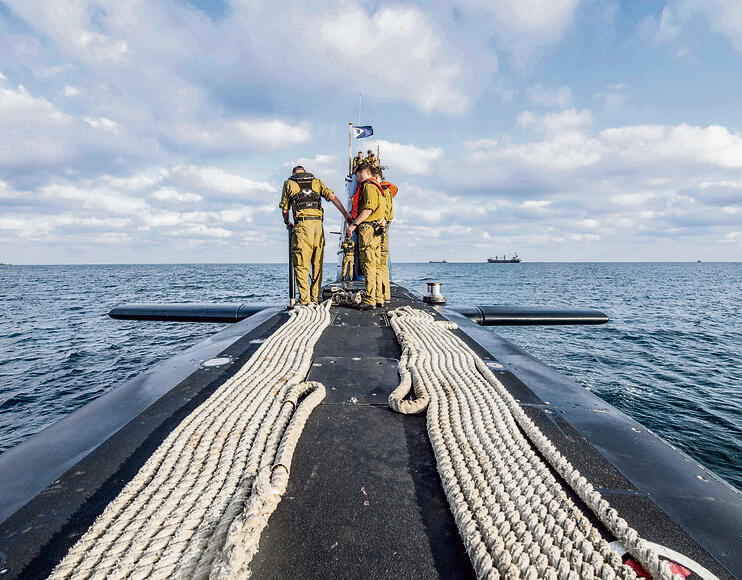

Preparations for docking; 'You come home and can't share anything with your family'
(Photo: Gil Nechushtan)
I ask about the activity of INS Rahav and the rest of the submarines at this time. One of the officers estimates that, during wartime, INS Rahav spends almost 70% of its time underwater - much more than usual. A. goes quiet. “It’s an untold story,” he finally says. “It’s all very uncertain. There’s a lot of room for initiative. I can say we’re very, very active, and not in running tests. But important operational activity. Utilizing our undercover advantage for cross-border activity.”
How important?
“To the level that we’ll be causing strategic damage if we don’t do what we’ve been tasked with.”
“During this war,” I say, “the AIF has discovered that it’s not alone in the skies. There are plenty of new threats such as drones. Do we still have the upper hand in the water sector?” A. tells me, “We can operate under threats, but we have to be careful and concerned about what we don’t know. This situation is so dynamic that you’re not relevant if you don’t initiate anew. We’ve done a lot of groundbreaking stuff during the war, including things that have surprised people who know how submarines operate. I couldn’t have imagined it even just a year ago.”
The submarines are in the eye of the public storm. The commission of inquiry and cautionary letters to Netanyahu and others have given submarines a bad name.
“I’m not involved in that, certainly not in this unit that can’t say what it does.” Col. A. won’t address the whirlpool outside the water. “When I look in the mirror, I see myself, and in the background, I see the nation I need to defend and I still need to account for what I do. The responsibility of utilizing the unit and the submarines to their best operational potential is what motivates me. From the moment I was granted this gift, my job has been to use it to its very fullest potential for the good of the country. “
I ask about submarine activities, the kind perhaps entailing moments of hysteria. “Hysteria isn’t in our lexicon. Yes, there are situations requiring emergency response” says Col. A., who then recalls two incidents from the time he was serving as a submarine commander.
There was the time he ascended with the vessel above water - to learn he wasn’t alone. Just imagine. “That was my baptism of fire as a commander.”
Or the operational activity when they were met by a surprise while maneuvering from one location to another. “It was a threat we could address, but we were conducting a mission that demanded secrecy. You’re very much aware that the cost of a mistake can be catastrophic. You’re very focused, and you have to be certain. The fate of the submarine rests on your shoulders. You then go home and you can’t talk about it. It stays with you.”
“You’re like on a little island, a bubble. They’re no masks in relationships between people,” explains submarine commander A. “The environment is, in some way, addictive.”
“Commanding a submarine is a personal process,” he says. “You’re your own worst enemy. You encounter yourself in a submarine.”
In two months’ time, the guy with the inquisitive eyes who doesn’t look at all like a fleet commander, will wrap up his time in this position. This will be as submarines are going out to sea, sometimes without a return date. I ask him whether he can imagine this moment. “We’re controlled by the current situation. There’s no time to dwell on farewells.” And, just as the conversation is coming to an end, he adds that maybe it’s good that we talked. “My family doesn’t know what I do, but they know I do it with all my heart. Maybe this article will help them understand.”
The submarine is now at its maximum, three-figure, depth. The pressure on the submarine goes crazy at this kind of depth. And the sea’s dark. The fish have teeth, but you don’t really feel it inside. “The vessel is unforgiving” As Col. A. warned earlier, “When it’s deep and under pressure, the cost of a mistake is very high.”
Deep Sea Champagne
In the submarine's Combat Information Center (CIC), metal cups are now being clinked together. They raise a toast, take a sip and the captain says a few words. This ceremony is known as "Deep Sea Champagne."
Oh, and the Champagne doesn’t taste of Champagne, more of brine with a hint of seaweed. “It’ssea water from outside” Lt. Col. A. announces cheerily as the Champagne from the depths of the Mediterranean makes its way to the depths of their stomachs. He explains that, “We drink sea water in a controlled manner so that we don’t drink sea water in an uncontrolled manner.” He has a permanent kind of smile, not just when treating guests to brine.
The submarine has laws of its own. The laws of time and nature look different here. Dawn, nightfall, heatwaves and the Earth turning on its axis mean nothing here. To, nonetheless, provide submarine residents some sense of time, the lights are dimmed in the evening. That’s it.
The laws of reality outside are also not part of the laws inside. The only communication conduit, and just in case of emergency, is a telegram. Neither WhatsApp, news updates nor news from home penetrate the steel walls of this war capsule traveling the maritime galaxy, protecting you from territorial goings on. It’s like a maritime sealed room. “Information about what’s going outside doesn’t make it through. You never know what it would do to people inside,” explains an officer.
Human laws are also different in the capsule. The soldiers here walk about without their uniform shirts. Ranks have no meaning either. In such extraordinarily crowded conditions, military distance isn’t an option.
As the submarine shakes around a little, we huddle together for dinner around a tiny tray of a table in the mess, that can accommodate 12. Dinner is chicken nuggets and thighs, beets and spicy, green tahini. They fill their plates, their elbows touching and their knees squeezed together. Here, in such intimate conditions that I wouldn’t know what I might compare, there’s just no room for being fake.
The officers describe the vibe. “You’re like on a little island, a bubble. They’re no masks in relationships between people,” explains submarine commander A. “The environment is, in some way, addictive.”
“The situation between people is so close that a week’s enough time to get to know a person from all angles,” says deputy submarine commander Capt. G. “If you’re pissed with someone, that’ll hold for about half a day. Longer’s just not possible. You simply have to fix it. “
You can’t bluff in a submarine” adds Capt. A. “The team feeling is so strong that you can’t pretend. Others will always see you here. When you see how people behave outside, you miss it in here.”
As dinner draws to a close, he points at the submarine deputy commander on his right for him to wash the dishes, as if he’s the washing-up boy. “There are no commanders’ costumes here.”
There's even a gym
Amid an endless maze of pipes, cables, gauges, air conditioning and purification systems, in the gaps between the pipes and the steel, niches have been allotted for human habitation.
The submarine’s deputy commander, Capt. C. shows me around. Here, on the lower deck, there’s a tiny cell with countless gauges and more equipment. And in the middle is one of the submarine’s three toilets. The one on upper deck comes with the submarines only, tiny shower. On the door hangs a piece of paper on which anyone wanting to shower must write their name there along with the time.
In another part of the submarine is a washing machine that recently broke down and close by, a tiny gym with weights, a treadmill, etc. that’s open 11:00–23:00. Very important in a place you really can’t walk very far. It’s just that within reach of the treadmill, are more beds. They sleep, run and do everything together.
Oh, and there’s a cooking station. Bald, bearded and tattooed Sgt. Maj. Y. stands there looking stern with his arms crossed. His left arm boasts a tattoo of a large ship, a chef’s skull and a submarine. He has half a fleet ready for battle on his arms.
Y. is the chef. The submarine goes nowhere without him. I ask about what there is to eat and learn that beans are on the menu. “Why not? On Shabbat, there’s hamin,” he says enthusiastically.
His station is a cube in some of which, you have to crouch down. It has two ovens, an electric stove and metal stoppers to make sure the cooking doesn’t go flying. Amid all this, are photographs - mainly of Y. with pavlovas. He just loves pavlova, but he’s also good at Cheakina. We had some, and it was much better than the sticky stuff you get in the market in Ramleh.
Y.’s tough-guy act is just a front. He’s constantly trying to win the hearts of everyone around him, and he has a strategic weapon: “I bring people to the submarine through their stomachs. Look, it’s all valves and pipes, everything here is grey” he says pointing all around. “The trainees show up from the submarine course and I make them Belgian waffles with sauces. It’s something they’ll remember.”
Capt. G. standing beside us remembers the omelet sandwich the chef made him at 5 a.m. on his first cruise as a cadet. He remembers an omelet from years ago, as if he’d dined at Robuchon's on braised lamb in wine. “It was one of the things that made me want to come here,” says G.
“You want to give the soldiers the best,” says the chef. “You sometimes ask them what they’d like. Someone may want something to remind them of home. They might say to me: ‘Chef, I want mashed potatoes with schnitzel and fried onions.’ They sometimes bring along their own recipes. “
He's 36, from Tirat HaCarmel, father of three and among the longest-serving men on the submarine. He remembers being on the submarine, receiving a telegram informing him that his wife was pregnant with their firstborn. That firstborn son is now eight.
“It was very moving, but I couldn’t hug her, so it’s a little sad too because she was going through it all alone,” he says. He then recalls other moments he’s missed – kindergarten, school and pictures from home, including the one when his son developed a chin. “Every picture is something I missed but, at the end of the day, I’m here for something much bigger.”
From shrimps to whales
I cram myself into one of five narrow bunks all crowded together, getting bumped on my head from above, and then again on my meniscus. I draw the curtain, and it’s dark.
It’s a strange moment. Being in a submarine means constantly colliding with things, over and over again. There’s no way of not colliding into dozens of things like elbows and faces all the time. You’re tired, you dream and you worry, and run into something else. Thoughts, heartbeats, breaths and hope all touch and mingle.
And here, now in bed, in the depths of the ocean at 3 a.m. with the curtain drawn, I’m finally alone. Almost alone that is, with other people lying only a curtain away. You hear snoring and sighing sounds. The radio system emits orders and the sea beyond the steel panels plays the sounds of a deep-water symphony.
Listening through the headphones at the sonar station, I’d heard the tam-tam-tam sound of the propellers of a merchant ship passing over somewhere above us. You can also hear crabs clicking and shrimp snapping, as well as whales, whose cries are longer than the dolphins’.
Just before going to sleep behind that curtain, I was sitting with three submarine combatants in the upper - a space used by the crew to socialize. Alongside the various systems, are books, board games, Jungle Speed and Frodo – a big hit here.
Maj. Gen. R., 21, from Herzliya is a sonar technician, Maj. Gen. B., 24, Ashdod is a weapons officer and Maj. Gen. N, 20, from Jerusalem is a torpedoman’s mate. “There’s a good chance the crew knows me better than my family does,” says Maj. Gen. R. before getting down to the business of entertainment.
On Fridays, they have “Friday Radio,” an internal news program of sorts, offering submarine news, including interviews, impersonations, etc. where everyone’s a target. They make kiddush over a festive meal at an adorned table with a dress code of fatigue pants and a button-down shirt. There are Shabbat prayers. “It’s insane,” says Maj. Gen. B. “I’m praying in the depths of the ocean. It sounds crazy, but it keeps me sane.”
Submarine crews have their own slang. Let’s take a quick look at a few dictionary definitions:
Bukraf – an awkward situation. “When you’re sitting around joking and someone says something completely irrelevant.“
Tofet – Hell on earth. Like when someone throws up in the submarine. They demonstrate.
Bib – A confused young recruit. “Someone who does something inappropriate in the submarine,” says B. Like opening the submarine door and letting in water, I suggest. “Like that,” they all agree.
It takes time to appreciate that they’ve created a world of their own. To the outside, it may seem like an alternative, or perhaps a diversion. Sometimes this diversion is what keeps them sane for weeks on end in the depths of the ocean.
Take Maj. Gen, R. On the morning of October 7, he was doing guard duty on shore. From what he was hearing over the radio, he realized it was chaos. He then heard that his twin brother, a combat LOTAR (special forces) soldier, had been told to report to Gaza border towns. In the meantime, he prepared the submarine and went out to sea, for weeks on end in which time he had no news about what was going on above ground.
“My fear was getting back to port and finding out what had happened,” he says. “I was very concerned about my brother, but I felt the submarine was a refuge. I was completely cut off and didn’t want to go back. Getting back to shore meant news.”
He only met up with his brother, R. three months after October 7. “I went through so much and so did he. It changed our closeness and our connection. You learn to appreciate things.”
Late at night in the upper, the submarine doctor, Capt. N., 30 tells me his own totally crazy story:
His partner is an army doctor like himself. On the evening of October 7, the two were supposed to practice the first dance for their wedding due to take place a few days later. “Everything was ready, even the seating plan,” says Dr. N. “But then, on that Shabbat, at 8 a.m., we quickly parted. Neither of us could imagine where we were going or what we’d be seeing.”
The day before the wedding date, he phoned his girlfriend in the Gaza Periphery. There would clearly be no first dance at the wedding - they hadn’t gotten around to practicing. And this is no time for dancing. But they agree not to let all craziness hinder their love.
Dr. N. describes how then, like in a movie, his girlfriend made it from the Gaza Periphery to the mikvah. She knocked on the door late at night, and convinced someone to let her in, and the next day, at sunset in a Haifa synagogue, the two doctors became husband and wife.
They went home, laughing all the way as the father of the bride had forgotten to bring the glass to break. The following day, one doctor went back to the Gaza Periphery and the other to sea. “When I got to my bunk bed in the submarine,” says N., “I just thought to myself that this wasn’t the honeymoon I was expecting.”
Whistling the the captain
And then comes the moment that’s worth it all: The submarine surfaces and its whale of a body is laid out before us, brushing off not only the seawater, but the darkness of the deep.
We’re on the submarine bridge. To the northeast, the sun’s playing hide-and-seek through the grey and white clouds. In the moments the sun pokes through, the water glistens like diamonds. Your heart opens up and is thankful.
Looking through the periscope sticking out of the Mediterranean like a mast, I saw two merchant ships about 400 meters away. I could almost touch the world outside. And here, now in the southeast, the Haifa beaches are getting closer. I see the Panorama Hotel towers, the university and the mountain, all bringing us closer to civilization. And the news land brings.
Meanwhile, as the submarine cruises at six knots, and we enjoy the last moments of divine detachment, the submarine fleet commander, Col. A. remembers a story from the war.
He had just gone out to sea, not knowing when he’d be back, without knowing whether his son would actually celebrate his planned bar mitzvah without Dad around. And wouldn’t be any good without Dad. “It’s only in the morning. I said I’d be there.”
He goes quiet as we enjoy the breeze on our faces. What is it about this moment? He explains that this is the moment we come back to reality, but a moment when we realize that the world has carried on without us.
And then the submarine, that it’s not entirely clear where it’s been or what its capabilities are, goes into a fortified hanger at the Haifa navy base. Someone cries out: "Ready to moor. Anchor ready to go.” And then the chef, who only looks like a tough guy gives out the banana cake he’d made specially for the occasion. In the middle of all of this, a moment before reality kicks in, Maj. Gen. R. points to the left of the mooring dock, to where the guy with the phones usually is.
The first off are the submarine commander and fleet commander, those still on board whistling at them. Another tradition.
I catch the submarine commander, Lt. Col. A. in a personal moment as he switches on his phone with its messages coming up. There’s a picture from home on the screen. His wife and two daughters are curled up asleep in the living room. As he gazes at the picture, examining every detail, he tells me that when he’s not home, they like sleeping together, as if trying to make out what’s going on at home in the time he’s been at sea.
He raises his head from the phone and the captain, with that permanent smile plastered across his face, says, “When you come back to land, in your mind, you’re already sailing again.”




